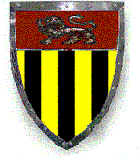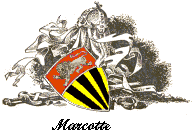 |
|
|
| , | ||||
|
 Fran�ais Fran�ais t is most commonly believed that the name Marcotte is derived from the French verb "marcotter." Marcottage, or to "marcotte" is a technique by which a branch of a tree is made to sprout its own roots before being detached from the mother plant (le nom marcotte, en ancien fran�ais a d�sign� un sarment de vigne servant � provigner, surnom de vigneron). t is most commonly believed that the name Marcotte is derived from the French verb "marcotter." Marcottage, or to "marcotte" is a technique by which a branch of a tree is made to sprout its own roots before being detached from the mother plant (le nom marcotte, en ancien fran�ais a d�sign� un sarment de vigne servant � provigner, surnom de vigneron).For the standard phonetic French pronunciation, and a definition in French for the term "marcotte" click here. Note that the backwards c in the phonetic spelling is pronounced like the o in 'or', and that the tt is pronounced but the final e is silent. Marcotte is the historical spelling for the surname in France. However, Marcot (pronounced Mar-co') is supplied by the University of Montr�al's Programme de recherche en d�mographie historique as the standardized version of the surname in Qu�bec, although the -t vs. -tte forms appears to have be uniformly-applied for all such names, rather than based on archival evidence or actual name origins. For validation of the historical spelling, see F�camp 'Marcotte' bapistm records for Jacques, Nicolas, Charles and other ancestors at: F�camp Marcotte documents. Such "marcotting" or "marcotteage" is a process employed in vineyards, for example. The late Father Jean Marcotte, a Capuchin monk and primary genealogist of the Marcotte families suggested in his Dictionnaire Genealogique des Familles Marcotte that there may also be some link to the name Margot. Father Jean Macotte reported that Fécamp archivist Jean LeMaitre (also a Marcotte descendant) notes that a monk named Hughes Margot was sent to King Harold of England, by William the Conqueror to seek a compromise, prior to the Norman invasion of England. The failure of that mission led to the Battle of Hastings in 1066. The relevance of this information is that William the Conqueror (the Duke of Normandy), upon landing in England made his encampment in the friendly territory of the Norman Monks of Fécamp, who held land near Hastings (click here or here to view source). According to the medieval historian Robert Wace (writing in the mid 1100s) Hughes Margot was one of these Fécamp monks. Fécamp, of course, is the city of ancestral origin in Normandy where originated the Marcottes that later colonized Quebec. It is very possible, perhaps even probable, that the name Margot evolved by the 1500s to Marcot and Marcotte (Marcot and Margot and other variations - Marecot, Maregot, Marquot - were used almost interchangeably on deeds, baptismal records and marriage contracts in those days depending on who was doing the writing). Margot is believed to be a name of Norman origin, while Le Dictionnaire Etymologique du Francais, by J. Picoche (ISBN 2-85036-013-9) contains the following entry indicating a possible Latin origin for "Marcotte" from the latin agronomical term "marcus": There is also some indication that the name Margot is - like many Norman surnames - of Viking origin, dating to the conquest of northwest France by the Viking King, Rollo. Sometimes, the simplest explanation is the the most logical. Marcot is also a diminutive form of the name Marc. (like Billy is to William; en Picardie, peut d�signer un hypocoristique de Marc). Recent research by Frenchman (and Marcotte descendant) Dominique Ren� Th�z� suggests that the great, great grandfather of Jacques and Nicolas Marcot was a man named "Marqot, Marcot or Marquot" born about 1460 in Marcq, France. Marcq-en-Breuil is located in the Picardie region of France near the Val de Somme and the loaction of what would have been Flanders in the late 15th century. Genealogical support for this line of descent is found in the archives of the Town Hall in F�camp, France, as well as in the Armorial d'Artois et de Picardie (Généralité d'Amiens), and in the Armorial de Picardie: (Généralité: Soissons). The son of this "Le Marcot" ancestor was Arthus Marcotte, a gardiner/landscaper in F�camp, who was born around 1510. Archival records in F�camp make several references to Arthus as a well-known horticulturist who did much to beautify the city. The appearance of the Marcotte family name in F�camp preceded (by as much as 75 years) - the first recorded use of the verb "marcotter." I propose therefore that this very specialized verb originated in reference to Arthus Marcotte,(such as pasteurization deriving from Louis Pasteur) rather than the family name deriving from the verb. If this theory is wrong, then by chronological evidence, the Marcotte name only 'coincidentally' resembles the verb. The earliest reference I have been able to find for the spelling "Marcotte" is from April, 1206, at the founding of the Hospital of Artois, in the village of Hesdin, when a Lambert Marcotte is mentioned as an alderman (esquevin=echevin) of Hesdin(g), during the reign of King Philippe Auguste of France. The next earliest is in the mid-1300s for a Willaume Marcotte, a fief of the Provost of Saint-Ricquier, in Ponthieu, near Abbeville, in present day Picardie, France. This reference was a call to arms for Willaume Marcotte to fight with the French against the English for the area once known as Flanders during the Hundred years War (1338-1453) . There is no further mention of his family, but a Hughes Marcotte (spelled "Hue" in the archives) is found living in Abbeville 1467, and a Jean Marcotte on the same fief in 1530 and 1543. At least one use of the surname Turcot also originated with a descendant of the Marcotte family,� having originated as a "dit" name for one of Jacques Marcot's descendants, to distinguish him from another branch. However, the majority of the Turcotte branches have no connection to the Marcotte family.  Back to Marcotte Genealogy Page Back to Michael Marcotte's HomePage |




